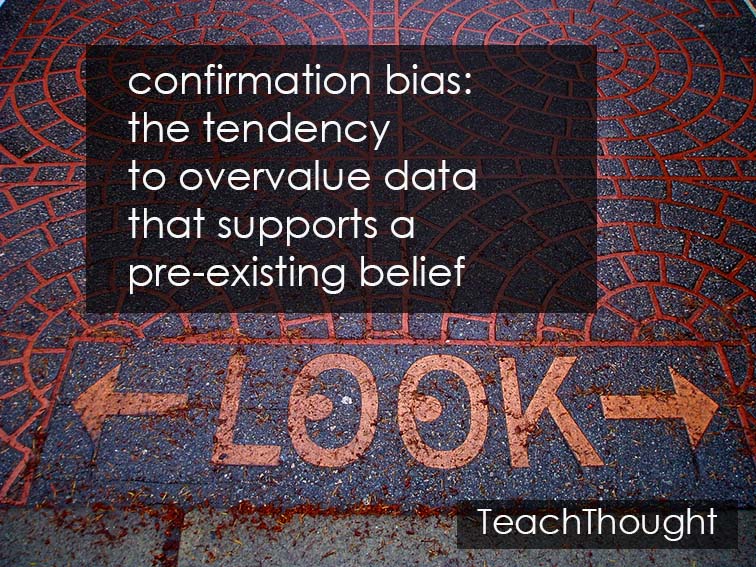
What Is Confirmation Bias? A Brief Overview
by Terry Heick
What is confirmation bias?
Broadly speaking, confirmation bias is the tendency of people to overvalue data that supports their own beliefs.
One of the many cognitive biases, whether based on fear (e.g., ‘I’m going to lose my job’) or inaccurate and/or incomplete data (e.g., a stereotype), someone who falls victim to confirmation bias will form an opinion and then seek out and/or overvalue data that supports that opinion. In the former example of losing your job, because of worry over losing your job, you would begin to ‘notice’ things that seemed to support that theory.
Maybe you begin to see how your principal doesn’t ‘visit your room as often as they used to.’ You also notice that the school has placed a classified ad for an open teaching position that seems to fit the one you currently fill. And finally, you’ve ‘been hearing’ that the district is ‘making some changes.’ Because all of these support your initial fear (that you’re going to lose your job), they all resonate more strongly with you. They’re memorable and alarming and seem credible.
See also 3 Modes Of Thinking: Convergent, Divergent, And Lateral Thinking
What Is Confirmation Bias And How Does It ‘Happen’?
The pattern is to form a theory (often based on emotion) supported by insufficient data, and then to restrict critical thinking and ongoing analysis, which is, of course, irrational. Instead, you look for data that fits your theory.
Commonly, there are five steps to confirmation bias:
1. Form a theory (or ‘have an opinion’)
2. Find ‘data’ that supports that opinion
3. Work hard to collect more and more data that really ‘confirms’ your theory (i.e., what you believe)
4. Identify the kinds of data that are most compelling to the people you most frequently want to convince of your theory (because that’s what people like to do), then collect and memorize and repackage and refine that data to more neatly fit your theory
5. Become more emotional in your theory-holding (i.e., your opinion) because you’re now surer than ever that ‘you’re right’
6. Continue to discount and discredit new or better data because then you’d have to reconstruct your belief system, apologize to people, admit you were wrong, etc.
How To Resist Confirmation Bias
How can you keep from committing confirmation bias? Constantly re-evaluate what you believe that you know, insist on the highest quality data, and embrace the possibility that we’re all wrong more frequently than we’re right.
The pattern, crudely put, would look something like this:
1. Consider all data equally and know how to separate good data from bad, fact from opinion, misrepresented facts from properly-contextualized facts, etc.
2. Form a theory based on said data/data sources
3. Be open to new data, ideas, constructs, and perspectives and revise your theories in response as necessary
4. Moving forward, use data to inform your theory forming instead of using your theories to inform your data seeking.
Summary
Confirmation bias is a killer of critical thinking.
And the opposite approach is exhausting. To constantly consider a broad set of evidence and data (historical patterns, existing trends, widespread indicators, alternative explanations, etc.) and then narrow it down to identify higher-quality data in order to form a ‘fluid’ conclusion that you then consistently revisit in light of ‘new’ data as it becomes available–data that wasn’t handpicked to support a theory but rather is fresh, valid, credible, and relevant–takes a lot of cognitive energy and thinking strategies and human determination, not to mention humility, which is why it’s not as common as it could be.
A silent factor here is the challenge of cognitive dissonance–holding two competing beliefs at once. This is uncomfortable, so when considering ‘what’s real,’ we tend to cling to one and pitch the other, then scour data to prove that we are right. This can result in a kind of self-fulfilling prophecy, where you essentially will your biases and insecurities into existence.
The definition of confirmation bias; Confirmation Bias Really Kills Thinking; image attribution flickr user dru
